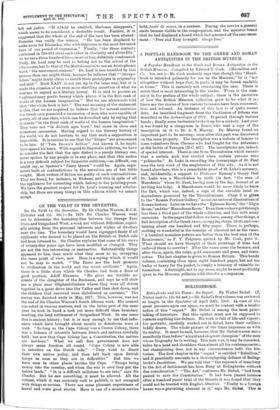ON THE VELDT IN THE SEVENTIES.
On the Veldt in the Seventies. By Sir Charles Warren, K.C.B. (Isbister and Co. 16s.)—In 1876 Sir Charles Warren went out to determine the boundary-line between the Orange Free State and Griqualand West, a work not without difficulties, especi- ally arising from the personal interests and wishes of dwellers near the line. The boundary would have zigzagged finely if all applicants who desired to be placed on the British or Dutch side had been listened to. Sir Charles explains that some of his views of twenty-five years ago have been modified or changed. They are not the less interesting or instructive. Substantially things appeared to him then much what they seem to us, occupying the same point of view, now. Here is a saying which it would not be easy to match. " The Boers are the best pioneers to civilisation in the world and the worst civilisers." Again, there is a little story which Sir Charles had from a Boer of good position, Adolf Erasmus. "He gives me terrible ac- counts of the slaughter of the Bushmen, and says he will show me a plain near Oliphantsfontein where they were all driven together in a great drive into the Valley and then shot down, and the children that survived were distributed as servants." The survey was finished early in May, 1877. This, however, was not the end of Sir Charles Warren's South African work. His counsel was asked in various matters, and in the latter part of the same year he took in hand a task yet more difficult than boundary marking, the land settlement of Griqualand West. In one sense this is ancient history ; but it is easy enough to see that influ- ences which have brought about results so disastrous were at work. "So long as the Cape Colony was a Crown Colony, there was a balance of interests between Dutch and natives carefully held ; but now that Cape Colony has a Constitution, the natives are nowhere." What we call free government does not always mean freedom all round. "Cape Colony is now able to interfere on the Dutch side." " They want to direct their own native policy, and then fall back upon British troops as soon as they are in difficulties." But this we have seen in other places besides the Cape. "Troops bring money into the country, and when the war is over they get the native lands." " It is a difficult millstone to see into," says Sir Charles. But he saw something, it must be allowed. All the -volume, which it was certainly well to publish, is not occupied with things so serious. There are some pleasant experiences of travel and some good stories. Here is one of a mission service held, feta., de mieur, in a canteen. During the service a general smile became visible in the congregation, and the minister found that he had displaced a board which had screened off the announce- ment " Free and Easy to-night. Grogs free."


























































 Previous page
Previous page